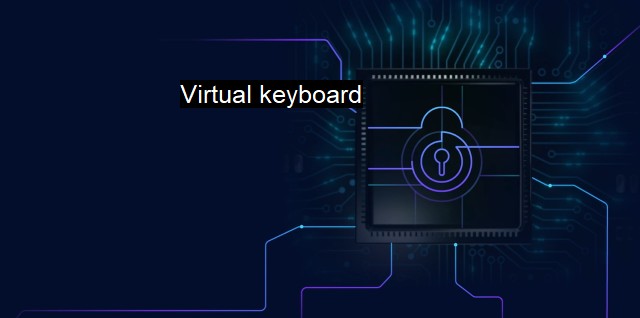What is Virtual keyboard?
Defending Against Keyboard-Klogging Malware: The Power of Virtual Keyboards in Cybersecurity
A virtual keyboard is a software component that permits users to input characters without the need for physical keys. Initially, this concept was designed to aid people with disabilities who struggled with operating keyboards. With the advancement of technology, this innovation was integrated into devices with touchscreen technology like smartphones and tablets.Now virtual keyboards play an increasingly crucial role. They offer a critical layer of defense against cybersecurity threats, particularly keylogging, on the digital landscape.
Keylogging is a technique employed by hackers for cyberattacks to capture a victim's sensitive information. A keylogger is a malicious software or hardware which records every key pressed by the user. The data includes passwords, credit card numbers, and personal messages amongst others, which is then forwarded to the hacker. Virtual keyboards serve as a potent tool to combat this threat of keylogging because they don't depend on keystrokes to enter data.
Virtual keyboards used in transactions relating to online banking and shopping, or just to log on to any password-protected websites or apps, offer a degree of protection against keyloggers. Instead of using physical keystrokes, which keyloggers can monitor, users can input data securely using the touchscreen or mouse clicks. Thus, since no keys are physically pressed, a keylogger cannot record the character sequence because there isn't one. This win is a significant advantage when you need to enter sensitive data online.
Desiring higher protection using virtual keyboards, some also use an "on-screen randomized keyboard." In these, the alphanumeric characters' positions get randomized for each log-in providing an extra layer of defense.
Notably, while virtual keyboards offer stronger defenses against keyloggers, they aren't foolproof. Sophisticated malware can take screenshots or track the movement and clicks of the mouse to bypass the protection provided by virtual keyboards. As such, this necessitates the implementation of antivirus software that can detect and remove keyloggers and other forms of malware.
Antivirus programs enhance the protection offered by virtual keyboards in several ways. For starters, they maintain an updated database of known malware and utilize real-time protection techniques to shield against potential threats. Beyond just identifying the threats, they take subsequent actions by placing these threats in a secure quarantine environment or deleting them completely from the user’s computer system.
To maximize the efficacy of virtual keyboards, consider using them together with comprehensive, updated antivirus software. Utilizing antivirus tools will not only shield your virtual keyboard from advanced modern-day threats, but it can also protect your applications, files and operatively system by securing possible breach points.
The interaction between virtual keyboards and antivirus software drives an essential principle in cybersecurity--layered defense. With variables such as human error and the innovative methods hackers keep devising, absolute security isn’t attainable. Hence, putting in place layered security mechanisms, such as combining a virtual keyboard with a comprehensive antivirus software, leads to overlapping protections mitigating if not completely closing loopholes.
Given that the technological landscape is forever evolving, and hackers are becoming more competent, cybersecurity is an ongoing battle. The use of tools such as virtual keyboards and antivirus software forms a crucial part of our defense strategies against these would-be attackers. The defense should always aim to outmaneuver hackers by staying informed about potential threats and promptly adapted to modern methods and software, which keep our information secure.

Virtual keyboard FAQs
What is a virtual keyboard and how can it enhance cybersecurity?
A virtual keyboard is a software-based input mechanism that allows users to type on their computer screen. The main purpose of a virtual keyboard is to protect the computer from keylogging malware which records keystrokes and sends them to cybercriminals. By typing on a virtual keyboard, you can avoid keyloggers and significantly enhance your cybersecurity.Does using a virtual keyboard to enter passwords increase security?
Yes, using a virtual keyboard to enter passwords can be a more secure way of typing in sensitive information. This is because keylogging malware can't capture keystrokes entered on a virtual keyboard since it's a mouse-based input method. However, keep in mind that using a virtual keyboard doesn't offer complete protection against all forms of cyberattacks.Are all virtual keyboards equally secure?
No, not all virtual keyboards are equally secure. Some virtual keyboards are more vulnerable to attacks than others, especially those that are not regularly updated or maintained. It's important to choose a reputable virtual keyboard software that is frequently updated to ensure maximum cybersecurity.Can antivirus software detect virtual keyboard malware?
Yes, antivirus software can detect and remove virtual keyboard malware if it's included in its virus definition database. Antivirus software can also scan for suspicious activity, including keylogging, and alert you if a virtual keyboard or other input method is behaving abnormally. However, it's important to keep your antivirus software updated to stay protected against the latest threats.| | A | | | B | | | C | | | D | | | E | | | F | | | G | | | H | | | I | | | J | | | K | | | L | | | M | |
| | N | | | O | | | P | | | Q | | | R | | | S | | | T | | | U | | | V | | | W | | | X | | | Y | | | Z | |
| | 1 | | | 2 | | | 3 | | | 4 | | | 7 | | | 8 | | |||||||